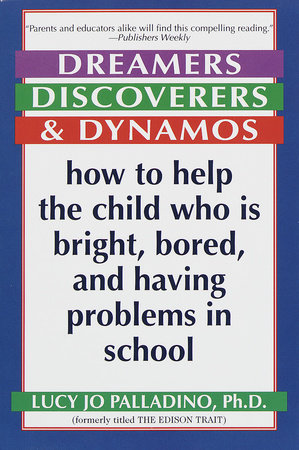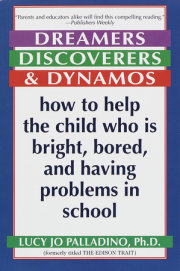CHAPTER 1
Does Your Child Have
the Edison Trait?
If a man does not keep pace with his companions, perhaps it is because he hears a different drummer. Let him step to the music which he hears, however measured or far away.
—Henry David Thoreau
AN INVENTIVE MIND
He was a boy who learned only by doing. At age six, he had to see how fire worked and accidentally burned his father’s barn to the ground. The next fall he began school, where he alternated between letting his mind travel to distant places and keeping his body in perpetual motion in his seat. Because he was distractible and restless, he did not last long in a formal classroom. His teacher called him “addled.” Eventually, his mother had to home- school him. As an adult he would recall: “My father thought I was stupid and I almost decided I must be a dunce.”
The core of his learning was his passion for experiments. As his new teacher, his mother gave his talent free rein. At the same time she infused him with the disciplines of study. With time and determination, he mastered his runaway mind. He grew up to become a prolific inventor, bringing the magic of electricity and sound recording into the world. He either invented or improved hundreds of practical conveniences. It is said that Thomas Alva Edison succeeded where others failed or never tried, because it was his nature to dare.
Today, a growing number of children have that nature to dare. Like young Edison, they are easily distracted and disorganized, but also wildly imaginative and inventive.
They have minds that are at home with meanderings and leaps of vast proportions. They make unexpected, sometimes startling, connections.
QUALITIES OF A CREATIVE MIND
There was once a man who drove a truck on a road through a town and got stuck under a bridge that had a low clearance. The men of the town gathered around the wedged truck to think of ways to dismantle the truck or the bridge. Finally, a young boy came up and asked, “Why don’t you let some air out of the tires?” That is what they did, and the truck went on its way.
This was a child who had the Edison trait. He saw an element of the scene that no one else saw, because they were busily and systematically focused on what to them was relevant to the solution. An Edison-trait child:
Expects the Unexpected
A child with the Edison trait makes sudden, astonishing connections. Because his inner critic disallows neither the ridiculous nor the sublime, he can be innovative, ingenious, and fascinating. He can see ordinary things in extraordinary ways, which is the very essence of creativity.
His sense of humor is disarming. It stems from keen perception and the ability to see things from a different perspective. Sometimes he exhibits the kind of straight-from-the-subconscious humor that makes successful stand-up comics so funny. He blurts out ideas that are just under the surface, things that most others would have automatically censored.
Thinks Autonomously
This is a child who stands up for his own ideas, especially when they are uncommon or nonconformist. He is an independent thinker and does not rely on the opinions of others to form his own judgments. In a matter of personal interest to him, he stands firm with conviction, even in the face of strong opposition.
Hyperfocuses and Persists
When the Edison-trait child is intrinsically motivated, he has formidable mental power. If he is working on a project that is his own brainstorm, he is determined, tenacious, and persevering. As if by magic, he can work for hours involved in what he is doing. He finds ways to overcome barriers; his passion sees him through. In matters of his own choosing, he has inner direction and resolve.
Is Diverse and Intense
Edison-trait children are pluralistic, nonconforming, and multifarious. Once they begin to speak on a topic of their choosing, clear your calendar … you’ll be here for a while. Flights of fancy are common. One thing leads to another, though sometimes the connections are not apparent to the rest of us.
Has a Mind That Is Holistic
The Edison-trait child notices and reacts to things from any and all directions, so he is likely to have a global sense of places he has been. Take this child to the shopping mall and he’ll probably be able to lead you back to your parked car.
Lives on His Own Schedule
Time passes slowly for this child when he is not engaged in an activity of interest. Otherwise, watch out! When an Edison-trait child works on a project of his choosing, he is dedicated and determined.
Loves to Come Up with Ideas
Some do this slowly and dreamily. Others are like kernels of popcorn popping. Many do both. They have qualities of being both a whimsical Dreamer and a high-charged Discoverer or turbulent Dynamo.
DOES YOUR CHILD HAVE THE EDISON TRAIT?
All children are imaginative and enjoy make-believe, but children who have the Edison trait live even closer to their imaginations. It is their lifeblood.
Children manifest the Edison trait in various ways. Some are quiet and reserved and live in their own worlds. Others are loud, interruptive, and bold.
Your child may be a Dreamer, a Discoverer, or a Dynamo. Or he may combine features of any or all of these patterns.
Dreamers drift from place to place, on a schedule of eternal time.
Discoverers have to find things out for themselves and do things their own way.
Dynamos are always in motion, with a flair for surprises, power, and speed.
If your child has the Edison trait, you’ll find that some passages in this book will sound as though I wrote them with him in mind. Others won’t fit at all. To see how closely your child’s patterns match the profile of children with this trait, take a moment and think about him since his earliest days. Then ask yourself these questions:
If your child is a Dreamer
Does he get absorbed or intensely involved in his own ideas much of the time?
Is he prone to saying things out of the blue?
Does he procrastinate to an extreme?
Are his interests and activities eclectic?
Does he start at least three projects for every one he finishes?
If your child is a Discoverer
Is he easily attracted to sights and sounds around him?
Is it vital for him to express his opinion?
Does he crave novelty, power, and excitement?
Is he always ready to speak, especially if you’re talking?
When he wants his own way—which is almost always—is he relentless?
Or, if your child is a Dynamo
Does he get aggressive or intensely emotional about his own ideas much of the time?
Is some part of his body always in motion?
Are chances to run and climb as vital as the air he breathes?
Does he have boundless energy, enough for about three children his age?
Do you find yourself wondering if he lacks common sense?
The more “yes” answers you gave to these questions, the more reason there is for you to read on.
Copyright © 2010 by Lucy Jo Palladino. All rights reserved. No part of this excerpt may be reproduced or reprinted without permission in writing from the publisher.








